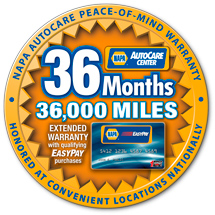
 The NAPA AutoCare Peace of Mind Warranty covers parts and labor on qualifying repairs and services for 24 months/24,000 miles.
The NAPA AutoCare Peace of Mind Warranty covers parts and labor on qualifying repairs and services for 24 months/24,000 miles.
There's no greater peace of mind than knowing you have one less worry by having your vehicles serviced by the professionals at your local NAPA AutoCare Center. They stand behind their work with the NAPA AutoCare Peace of Mind Warranty.
It's a written warranty that is honored at more than 14,000 locations nationwide-more than any other automotive repair brand.
So no matter where your travels take you, if you ever experience a problem with a covered repair, you can count on a NAPA AutoCare Center being nearby.
Why are old or bad tires dangerous? As stated above, your tires are an extremely important component of your car or truck. If you've ever been out of control in a vehicle, you'll know how scary being a powerless passenger inside a two ton metal box can be. Driving on tires that are too old, improperly inflated, out of balance, or not suited to weather conditions can spell disaster for your safe journey. Your tires were designed with a very specific task in mind. Using them improperly can have sudden and catastrophic consequences.
Signs your tires need air This issue can be fairly simple to spot. If your tire seems to be wider at the part which contacts the road, they probably need to be topped up with air. Driving on under-inflated tires wears them out faster due to uneven pressure on the sidewall and can lead to full-on flats and even end up shredding the tire off the wheel! Low tire pressure ruins your vehicle's fuel economy. If you've ever ridden a bicycle with under-inflated tires you know how much extra effort you have to put in to get moving and stay rolling. On the flip side of this, driving with too much air in your tires is also unsafe. While it's unlikely that hitting a large pothole would cause the tire to burst (remember they're built to last for thousands of miles) having too much air pressure in a tire reduces the size of the contact patch, or the area where rubber meets road. This can lead to less grip and control over your vehicle. Every tire manufacturer prints the correct tire pressure on the side of their tires, so it's easy to find out the perfect pressure for your ride.
Signs your tires are out of tread As with having over-inflated tires, a lack of tread can lead to less control and worse handling for your car or truck. Your tires' tread patterns help them to hold the road as well as channeling mud and water away from the areas that need to do the gripping. Without enough tread depth, your car can ride up on top of water on the road and cause you a complete loss of control. There are a few common methods of measuring tread depth, such as using a penny to gauge whether or not it's time to replace your tires, but we recommend coming into Beiler's Auto Repair Inc. in Sarasota, FL for a professional opinion on the matter. Not all tires are created equal and must be replaced at different times.
Signs your tires are damaged Signs that your tires are damaged can come from a few sources. A visual inspection can catch potential problems before they become major issues such as nails or rocks embedded in the tread grooves. Always remember that there's a great deal of pressure contained within your tires. If you see any gashes, bubbles or hear the hiss of air escaping it's best to stay away from that tire and enlist the help of a professional. Believe us, you don't want a tire exploding anywhere near you. You can sometimes feel tire damage while driving. If your car begins to make strange noises as it goes down the road or the handling suddenly becomes worse you should pull over as soon as it's safe. Driving on a flat is a bad idea, and can often lead to more severe damage to your vehicle.